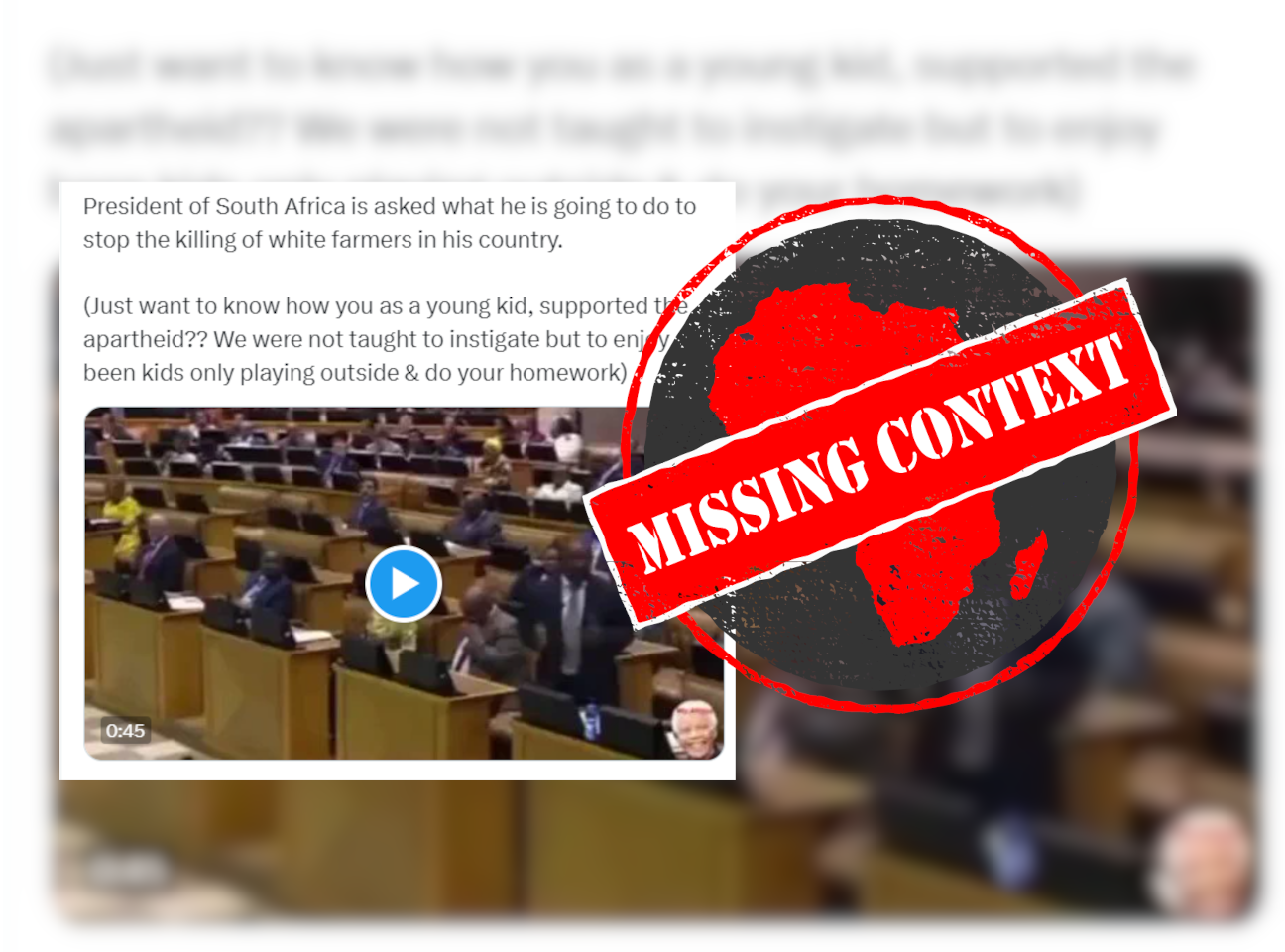IN SHORT: A clip from a 2016 video of Cyril Ramaphosa speaking in parliament has been shared in 2023, with false claims that Ramaphosa is responding to a question about farm murders.
A video of South African president Cyril Ramaphosa responding to a question in parliament has been shared on Facebook and Twitter, forwarded on WhatsApp, and even linked to in an article by Independent Media outlet Business Report.

It also appears on Facebook here, here and here, and on Twitter here, here, here and here.
In the video, Ramaphosa addresses another member of parliament, asking “what did he do when the apartheid regime was slaughtering our people?” Shortly afterwards, Ramaphosa says: “He is white, and being white means that he’s one of those who supported the apartheid regime.”
Apartheid, Afrikaans for “apartness”, was the official policy of racial segregation imposed by the white minority government of South Africa between 1948 and 1994.
The video was supposedly taken after Ramaphosa was asked what he was going to do to “stop the killing of white farmers in his country”. At least, that’s what the message shared with the video claims. But it’s not true.
We investigated the context behind Ramaphosa’s utterances.
Video from 2016, before Rampahosa was president
The most common version of the video is watermarked with a picture of former South African president Nelson Mandela. Red text covers part of Mandela’s face, although in most blurry versions of the video the text is illegible. The earliest version of the video Africa Check found was originally uploaded to the YouTube channel My Africa on 2 November 2016.
It appears that My Africa added the watermark – the text over Mandela’s face reads “My Africa” – and uploaded a slightly longer version of the video than many of the clips being shared online in 2023.
In the original video, Ramaphosa is referred to as “deputy president”, the title he held in 2016. The clip also shows that Ramaphosa is responding to politician Ian Ollis of the opposition Democratic Alliance, who had challenged his stance on historical strike-related violence.
The full meeting of the national assembly during which this exchange took place was broadcast to the South African parliament’s YouTube channel on 2 November 2016. Watching this in full confirms that Ollis did not mention “farm murders” or related topics in his remarks to Ramaphosa.
Ollis describes several past instances of strike violence, from 1987 to 2012, about which he says Ramaphosa “did nothing”, and then claims that “the only reason” Ramaphosa was acting to address strike violence in 2016 was “in order to become president” by improving his public image.
In his response, Ramaphosa asks Ollis what he did in response to violence committed by the apartheid state. Later in the broadcast, Ramaphosa withdraws his comments in response to a challenge from another member of parliament, and Ollis similarly withdraws a comment that Ramaphosa has “blood on his hands”.
At no point are farm murders mentioned.
‘Farm murder rate’ unclear
Farm murders and farm attacks have become a highly politicised issue in South Africa, with some advocacy groups, political parties and even billionaire Elon Musk suggesting that the attacks are politically motivated.
Africa Check has written several times about the complicated statistics involved in attacks and murders on farms in South Africa. In short, any estimate of a farm murder rate is likely to be inaccurate because of the complications involved in calculating both the number of farmers in South Africa, and the number of farm murders.
Whatever the complexities of reporting on the number of farmers killed in South Africa, Ramaphosa was not responding to this topic in the video clip from 2016 still doing the rounds on social media in 2023. To suggest this is misleading.
The Business Report article did not claim that Ramaphosa’s response in this video was to a question about farm murders. However, the article includes a link to the seven-year-old video and this is also misleading.
Republish our content for free
For publishers: what to do if your post is rated false
A fact-checker has rated your Facebook or Instagram post as “false”, “altered”, “partly false” or “missing context”. This could have serious consequences. What do you do?
Click on our guide for the steps you should follow.
Publishers guideAfrica Check teams up with Facebook
Africa Check is a partner in Meta's third-party fact-checking programme to help stop the spread of false information on social media.
The content we rate as “false” will be downgraded on Facebook and Instagram. This means fewer people will see it.
You can also help identify false information on Facebook. This guide explains how.


Add new comment